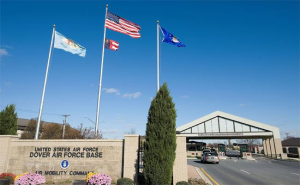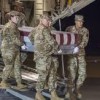- City and Installation Guide
- Installation Listings
- Dover Air Force Base
Dover Air Force Base
Installation Listings
Geographical Address
Contact Info
Dover Air Force Base is home to the 436th Airlift Wing, commonly known as the "Eagle Wing" and the 512th Airlift Wing, the Reserve associate, as the "Liberty Wing." Team Dover refers to both of the Wings. Dover is home to the C-5 Galaxy and C-17 Globemaster III. Team Dover's mission focus is to safely fix and fly aircraft, prepare and deploy Airmen, move cargo, and return America's fallen heroes with dignity, honor and respect.
The primary mission of the 436th Airlift Wing is to provide strategic global airlift capability. The impact from Dover's mission can be seen all around the globe on a daily basis. Dover AFB is home to the Department of Defense's largest and most technologically advanced aerial port. Dover AFB also operates as the only Continental US Port Mortuary in the Department of Defense. The mortuary plays a vital role as a place of honor where the remains of DoD service members killed overseas are received. Dover AFB also hosts the Armed Forces Medical Examiner System (AFMES).
History
Immediately after the U.S. entered WW II in 1941, the newly-completed Dover Municipal Airfield was leased to the U.S. Army Air Corps and assigned to the Eastern Defense Command as a coastal patrol base. By Christmas of that year, the 112th Observation Squadron, a federalized Ohio National Guard unit, flew the first missions from the field. During the next 55 years, a variety of flying organizations would call Dover home. Eventually, the base became home to the only all-C-5 wing in Air Mobility Command and the largest, busiest airport facility on the U.S. east coast.
Early in 1942, a construction program began extending the runway and making the airfield suitable for the operation of heavy aircraft. In April, the 39th Bombardment Squadron equipped with B-25 "Mitchell" medium bombers, conducted anti-submarine patrols. In February 1943, the 39th Bombardment Squadron moved to Fort Dix Army Field, New Jersey, and Dover closed to air traffic until completion of runway construction. The 7,000 foot runway and 29,000 square yards of paved apron would be completed in August 1943 when the airfield reopened. The Army Air Forces used Dover as a training base for hundreds of P-47 Thunderbolt fighter pilots. These pilots earned their wings under the watchful eyes of live combat instructors.
Map
-
{{#owner}}
-
{{#url}}
{{#avatarSrc}}
{{name}} {{/url}} {{^url}} {{#avatar}} {{& avatar}} {{/avatar}} {{name}} {{/url}} - {{/owner}} {{#created}}
- {{created}} {{/created}}






